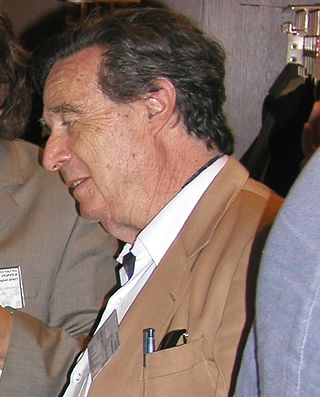Related Research Articles

Falsifiability is a deductive standard of evaluation of scientific theories and hypotheses, introduced by the philosopher of science Karl Popper in his book The Logic of Scientific Discovery (1934). A theory or hypothesis is falsifiable if it can be logically contradicted by an empirical test.

Sir Karl Raimund Popper was an Austrian–British philosopher, academic and social commentator. One of the 20th century's most influential philosophers of science, Popper is known for his rejection of the classical inductivist views on the scientific method in favour of empirical falsification. According to Popper, a theory in the empirical sciences can never be proven, but it can be falsified, meaning that it can be scrutinised with decisive experiments. Popper was opposed to the classical justificationist account of knowledge, which he replaced with critical rationalism, namely "the first non-justificational philosophy of criticism in the history of philosophy".

The problem of induction is a philosophical problem that questions the rationality of predictions about unobserved things based on previous observations. These inferences from the observed to the unobserved are known as "inductive inferences". David Hume, who first formulated the problem in 1739, argued that there is no non-circular way to justify inductive inferences, while acknowledging that everyone does and must make such inferences.

Critical rationalism is an epistemological philosophy advanced by Karl Popper on the basis that, if a statement cannot be logically deduced, it might nevertheless be possible to logically falsify it. Following Hume, Popper rejected any inductive logic that is ampliative, i.e., any logic that can provide more knowledge than deductive logic. This led Popper to his falsifiability criterion.

John Popper is an American musician and songwriter, known as the co-founder, lead vocalist, and frontman of the rock band Blues Traveler.
David Charles Stove was an Australian philosopher whose writings often challenged prevailing academic orthodoxy. He was known for his critiques of postmodernism, feminism, and multiculturalism.
Evolutionary epistemology refers to three distinct topics: (1) the biological evolution of cognitive mechanisms in animals and humans, (2) a theory that knowledge itself evolves by natural selection, and (3) the study of the historical discovery of new abstract entities such as abstract number or abstract value that necessarily precede the individual acquisition and usage of such abstractions. As a branch of inquiry in epistemology, evolutionary epistemology lies at the crossroads of philosophy and evolutionary biology.

William Warren Bartley III, known as W. W. Bartley III, was an American philosopher specializing in 20th century philosophy, language and logic, and the Vienna Circle.
David William Miller is an English philosopher and prominent exponent of critical rationalism. He taught in the Department of Philosophy at the University of Warwick in Coventry, UK. where he is Reader in Philosophy. He has been Honorary Treasurer of the British Society for the Philosophy of Science.
Horror Victorianorum, coined by the philosopher David Stove, is an extreme distaste or condemnation of Victorian culture, art and design. The term was used in Stove's book The Plato Cult as part of his argument against Karl Popper and other philosophers whom he characterised as "modernists". For Stove, Popper was influenced by the pervasive anti-Victorian mentality of the era, epitomised by Evelyn Waugh's book A Handful of Dust, in which the absurdity of Victorian values is expressed by a parody of "Victorian" conceptions of the civilizing mission of imperialism, when the hero is finally trapped in the Amazonian jungle, forced eternally to read the works of Dickens to a tribal chief.

Alan Edward Musgrave is an English-born New Zealand philosopher.
Wittgenstein's Poker: The Story of a Ten-Minute Argument Between Two Great Philosophers is a 2001 book by BBC journalists David Edmonds and John Eidinow about events in the history of philosophy involving Sir Karl Popper and Ludwig Wittgenstein, leading to a confrontation at the Cambridge University Moral Sciences Club in 1946. The book was a bestseller and received positive reviews.

Joseph Agassi was an Israeli academic with contributions in logic, scientific method, and philosophy. He studied under Karl Popper and taught at the London School of Economics.

Popper and After: Four Modern Irrationalists is a book about irrationalism by the philosopher David Stove. First published by Pergamon Press in 1982, it has since been reprinted as Anything Goes: Origins of the Cult of Scientific Irrationalism and Scientific Irrationalism: Origins of a Postmodern Cult.
British Journal for the Philosophy of Science (BJPS) is a peer-reviewed, academic journal of philosophy, owned by the British Society for the Philosophy of Science (BSPS) and published by University of Chicago Press. The journal publishes work that uses philosophical methods in addressing issues raised in the natural and human sciences.

The Cambridge University Moral Sciences Club, founded in October 1878, is a philosophy discussion group that meets weekly at the University of Cambridge during term time. Speakers are invited to present a paper with a strict upper time limit of 45 minutes, after which there is discussion for an hour. Several Colleges have hosted the Club: Trinity College, King's College, Clare College, Darwin College, St John's College, and from 2014 Newnham College.
1992 in philosophy
The Kuhn-Popper debate was a debate surrounding research methods and the advancement of scientific knowledge. In 1965, at the University of London's International Colloquium in the Philosophy of Science, Thomas Kuhn and Karl Popper engaged in a debate that circled around three main areas of disagreement. These areas included the concept of a scientific method, the specific behaviors and practices of scientists, and the differentiation between scientific knowledge and other forms of knowledge.
References
- ↑ "David Stove (1927-1994)". AAPHSSS Newsletter. August 1994. Archived from the original on January 13, 2008. Retrieved 30 July 2015.
- ↑ "Sir Karl Popper Is Dead at 92; Philosopher of 'Open Society'". The New York Times. 18 September 1994. Retrieved 21 January 2013.